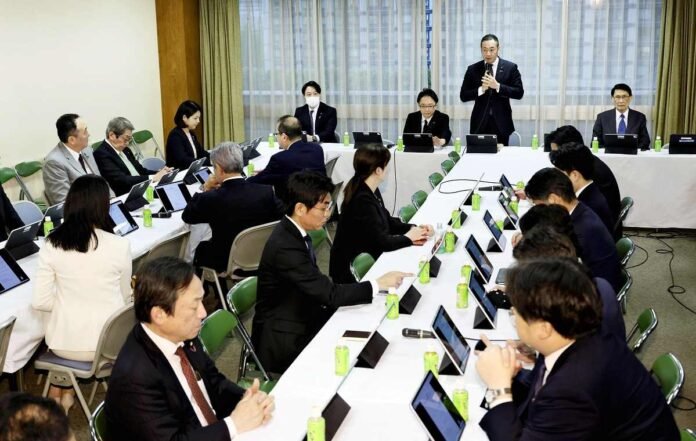The task force meeting of the Liberal Democratic Party’s Political Reform Headquarters will be held at the LDP headquarters in Tokyo on Tuesday.
20:00 JST, April 24, 2024
Draft proposals on the reform of political funds were presented on Tuesday at a meeting of a task force of the Liberal Democratic Party’s Political Reform Headquarters, and members reached an overall agreement on the draft.
The LDP and its ruling coalition partner Komeito, who jointly held a working-level meeting on Wednesday, are poised to finalize the draft proposal as ruling parties in early May. The draft proposals aim to revise the law on the control of political funds.
One proposed measure would require lawmakers to certify in writing that they have properly reviewed the contents of their political funds reports and found them legally adequate. The proposed requirement is intended to clarify legislators’ responsibility to oversee their treasurers.
If a treasurer is disciplined for failing to adequately report on political funds, lawmakers who provide inadequate oversight could face penalties including loss of their positions and suspension of their civil rights. If they fail to report the income in their political funds report, they would have to pay the same amount to the national treasury.
The LDP hopes this move to “seize” unreported political funds will prevent lawmakers from creating hidden funds.
The LDP’s reform proposals also include strengthening third-party audits of political fund reports and expanding the scope of audits for political organizations linked to Diet members to include income. Currently, such audits only look at expenditure.
Factions will also be subject to audits. Lawmakers will be required to file and make public reports on political funds on the Internet.
The party plans to consider additional measures in the future, such as reforms regarding the funds parties provide to lawmakers for political activities. Komeito and opposition parties are demanding that such funds be made public.
The issue of expanding reporting of names and other information about party ticket buyers is also left open for future consideration.
The Constitutional Democratic Party of Japan announced the outlines of its political reform plan, which would require not only treasurers but also lawmakers themselves to sign the political fund reports of political organizations. It would make them a criminal offense if they made omissions or false data, either intentionally or through gross negligence.
Careful discussion needed
Governing and opposition parties are broadly in agreement on the direction of legal revisions to introduce tougher penalties against politicians and stricter oversight obligations over the management of political funds.
However, they still need to discuss many issues, such as the scope of political organizations subject to the law, and what to do in the event of deliberate misconduct by a treasurer.
Tomoaki Iwai, professor emeritus at Nihon University, said the LDP’s proposal fails to ensure full transparency because it does not require a third party to assess the degree of culpability for misreporting or non-reporting of political funds.
“The decision to disqualify a legislator elected by voters is a serious matter and requires careful discussion,” he said.
Things are difficult within the ruling parties
The LDP hopes to reach a consensus with Komeito on the proposal in early May and move on to full-fledged talks between the ruling and opposition parties, starting after the Golden Week holiday.
To achieve a quick decision within the ruling parties, the LDP’s proposal reflects Komeito’s wishes, such as issuing statements by lawmakers declaring that they have audited the contents of their political funds reports and a broader scope of audits by third parties, in addition to stricter controls. punishments for the legislators themselves.
However, the two parties still need to bridge the gap on many issues, such as funds for political activities provided by a party to its members and the norms for disclosing names of ticket buyers for a fundraising party.
Komeito calls for disclosure of how funds are used for political activities, but Prime Minister Fumio Kishida, who is also chairman of the LDP, said: “We must take into account the privacy of individuals who cooperate with political parties and the trade secrets of companies. .”
Komeito is also calling for lowering the mandatory reporting threshold for the names of those purchasing tickets to a fundraising party from the current level of “over ¥200,000” to “over ¥50,000,” but there is strong reluctance within the LDP to do this.
Even if the LDP and Komeito manage to reach an agreement, the obstacles to revising the law are still high. The CDPJ calls for a total ban on political fundraising parties, and Nippon Ishin (Japan Innovation Party) calls for full disclosure of the names of ticket buyers. The CDPJ, Ishin, the Japanese Communist Party and the People’s Democratic Party are all united in calling for a ban on funds that parties provide to lawmakers for political activities.
In an earlier case of a bill disputed between the ruling and opposition parties – revision of the law on immigration control and refugee recognition – the government and ruling parties won the support of Ishin and some other parties to pass the bill .
“Like an invoice [to revise the Political Funds Control Law] If the proposal is not adopted during the current session of parliament, it will further create public mistrust of politics,” a senior Ishin official said. “Ishin will act as a mediator if the gaps in talks between the ruling and opposition parties are not bridged.”



